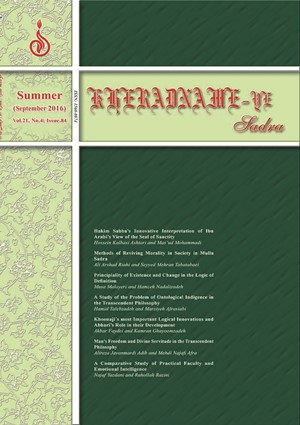-
-
List of Articles
-
Open Access Article
1 - سرمقاله
Seyyed Mohammad Khamenei -
Open Access Article
2 - Hakim Sahba’s Innovative Interpretation of Ibn Arabi’s View of the Seal of Sainthood
Hossein Kalbasi Ashtari -
Open Access Article
3 - Methods of Reviving Morality in Society in Mulla Sadra
Ali Arshad Riahi Seyyed Mehran Tabatabaei -
Open Access Article
4 - Principiality of Existence and Change in the Logic of Definition
Musa Malayeri -
Open Access Article
5 - A Study of the Problem of Ontological Indigence in the Transcendent Philosophy
Hamid Talebzadeh Marziyeh Afrasiabi -
Open Access Article
6 - Khoonaji’s most Important Logical Innovations and Abhari’s Role in their Development
Akbar Faydei Kamran Ghayoomzadeh -
Open Access Article
7 - Man’s Freedom and Divine Servitude in the Transcendent Philosophy
Mehdi Najafi Afra -
Open Access Article
8 - A Comparative Study of Practical Faculty and Emotional Intelligence
Najaf Yazdani Ruhollah Razini
-
The rights to this website are owned by the Raimag Press Management System.
Copyright © 2017-2026







